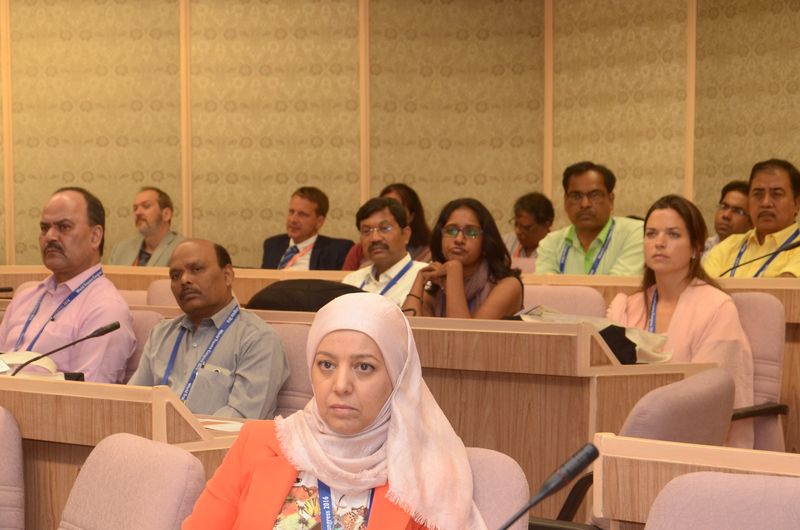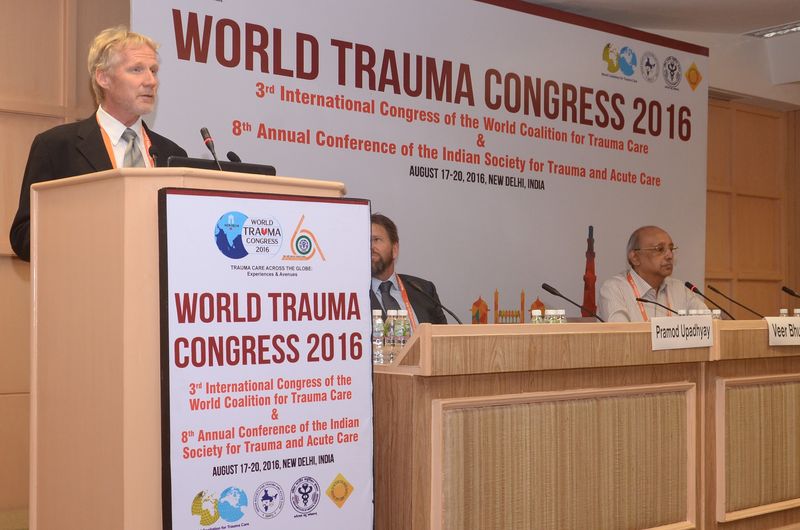Across the world, as many as 90% of the total trauma deaths occur in low-income and middle-income countries. Keeping this in view, the availability of good emergency response mechanisms and trauma care facilities in the South Asia region becomes vital. It helps prevent as well as control morbidity and mortality to a significant extent. But, is ‘intervention in the golden minute’ easier said than done – especially when it is in the middle of a disaster or conflict situation?
This was one of the many issues discussed at a session facilitated by Dr Harald Veen, the ICRC Chief Surgeon, on the third day of the World Trauma Congress (WTC) organised by the All India Institute of Medical Sciences on 17-20 August at Vigyan Bhawan in New Delhi.
“The bulk of your patients come with open and infected wounds. How do you prepare for it? Where there are no hospitals, we have mobile surgical teams. Many of these are in the middle of nowhere. We have to treat the patients with whatever appropriate means are available to us,” affirmed Dr Veen.
The ICRC is associated with a total of 439 hospitals across 28 countries. Of these, Dr Veen informed, the ICRC medical staff is present round the clock in about 20 hospitals – all in the big conflict zones. In 2015, the ICRC medical teams responded to the needs of 1,90,000 patients across the globe.
Underlining the importance of delivering quality services and improving the standards, Dr Veen propounded, “We do surgical programmes and engage in research. We also do a lot more teaching and training now and it’s growing. Treating our patients is critical. Training to change and improve policies for all future patients is also equally important.”

Jeremy England, the head of the Regional Delegation of the ICRC in New Delhi, making his opening remarks at the session during the 3rd World Trauma Congress.
In his opening remarks, Jeremy England, the head of the Regional Delegation of the ICRC in New Delhi, spoke about the indomitable spirit of medical professionals who serve in emergency situations. “Unfortunately, from Syria to Yemen to Iraq, we see mass civilian casualties as well as attacks on civilian infrastructure, hospitals and health workers. We see the incredible courage of doctors, nurses, medical staff as well as first-aiders as they respond to the needs of the people. We recognise this work the world over.”
Jeanine Scheibel, a medical student from Berlin, Germany, who attended the session was especially curious about how the organisation manages to provide a relatively safe environment for the doctors and nurses and how it establishes contact with parties to the conflict in order to ensure medical professionals can carry out this work.
According to Sheryl Mathews, a student of surgery in Kerala University, trauma care needs more focus than it has received so far and a beginning has been made at the 3rd WTC in New Delhi which identified trauma as an epidemic.

Delegates participate in the session facilitated by Dr Harald Veen, the ICRC Chief Surgeon, on traumatology in emergency situations at the World Trauma Congress.
“It was inspiring to hear some of the stalwarts talk about their experiences in trauma and disaster management,” said Dr Anita Muthusami, another delegate at the WTC. For Dr Muthusami and many like her, the exchange and learning at the WTC has made the resolve to serve humanity stronger.
This was the first time the WTC will be held in India and it brought together 2500 delegates and 100 international faculty.


